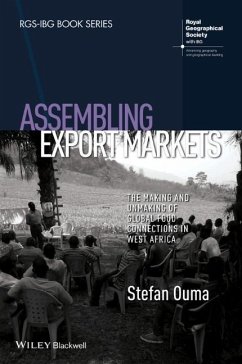Assembling Export Markets explores the new 'frontier regions' of the global fresh produce market that has emerged in Ghana over the past decade.
Represents a major and empirically rich contribution to the emerging field of the social studies of economization and marketization
Offers one of the first ethnographic accounts on the making of global commodity chains 'from below'
Denaturalizes global markets by unpacking their local engagement, materially entangled construction, need for maintenance, and fragile character
Offers a trans-disciplinary engagement with the construction and extension of market relations in two frontier regions of global capitalism
Critically examines the opportunities and risks for firms and farms in Ghana entering global fresh produce markets
Represents a major and empirically rich contribution to the emerging field of the social studies of economization and marketization
Offers one of the first ethnographic accounts on the making of global commodity chains 'from below'
Denaturalizes global markets by unpacking their local engagement, materially entangled construction, need for maintenance, and fragile character
Offers a trans-disciplinary engagement with the construction and extension of market relations in two frontier regions of global capitalism
Critically examines the opportunities and risks for firms and farms in Ghana entering global fresh produce markets
'In transparently clear prose, Stefan Ouma has written awonderfully rich empirical account of how global markets fortropical fruit are made both materially and institutionally at theintersection of very particular local sites. The book is anotherterrific example of the usefulness of the theory of economicperformativity that German economic geographers have increasinglyhoned and made their own.'
-- Trevor Barnes, Department of Geography, University ofBritish Columbia
'In this provocative book, Ouma challenges theconventional wisdom of both market enthusiasts and critics. Throughinsights from across the social sciences, he shows how both marketinstitutions and the persons who perform them always emerge fromparticular messy historical circumstances, creating differentformats and distributions of power in different locations.Ouma's 'on the ground' study offers a new andimportant approach to understanding markets.'
-- Lawrence Busch, Department of Sociology, Michigan StateUniversity
-- Trevor Barnes, Department of Geography, University ofBritish Columbia
'In this provocative book, Ouma challenges theconventional wisdom of both market enthusiasts and critics. Throughinsights from across the social sciences, he shows how both marketinstitutions and the persons who perform them always emerge fromparticular messy historical circumstances, creating differentformats and distributions of power in different locations.Ouma's 'on the ground' study offers a new andimportant approach to understanding markets.'
-- Lawrence Busch, Department of Sociology, Michigan StateUniversity








